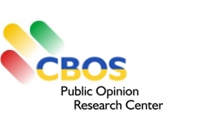| LATESTPUBLICATIONS Polish Public Opinion March 2023
 | Attitude to nationalities one year after the outbreak of war
|
 | Opinions about the role of the United States
|
 | Attitudes towards the energy transformation
|
 | Attitude to the development of wind energy
|
"Opinions and Diagnoses"no 48
Young Poles in CBOS Surveys 1989–2021
no 49
Youth 2021
no 50
Secularisation in Poland
Reports | Poles about War in Ukraine
|
 | Who Will Win the Election – Predictions Six Months before Voting Day
|
 | Moods on the Job Market in March
|
 | Knowledge about Warsaw Ghetto Uprising and Its Significance 80 Years after Outbreak
|
 | Social Moods in the Last Quarter
|
 | Poles about Their Debts and Savings
|
 | Attitude to Abortion
|
 | Political Party Preferences in April
|
 | Financial Situation of Households
|
 | Opinions about Parliament and President in April
|
 | Attitude to Government in April
|
 | April Ranking of Trust in Politicians and Public Figures
|
|
|
The Significance of the Warsaw Ghetto Uprising
| It is 80 years since the uprising in the Warsaw Ghetto. An overwhelming majority of Poles (89%) has heard about it. Of those, six out of ten (60%) say that this uprising is currently important chiefly for Jews. Fewer than half (46%) think that it has particular significance for Polish people, while over a third (36%) say its importance is rather for the elderly. Relatively rarely is it seen as significant only for those whose lives are connected with Warsaw in some way. At the same time, seven respondents out of a hundred (7%) think that the Warsaw Ghetto Uprising is of little interest to anyone today. The last decade, however, has seen a weakening of the attitude that this event is of significance mostly to Jews. Moreover, more people than in 2013 see it as particularly significant for Polish people in general, while fewer say it is of concern chiefly to the older generation.
| |
| More on this subject in the CBOS report.
| This ‘Current Events and Problems’ survey (395) was conducted using a mixed-mode procedure on a representative sample of named adult residents of Poland, randomly selected from the National Identity Number (PESEL) register. Respondents independently selected one of the following methods: Computer Assisted Personal Interview (CAPI); Computer Assisted Telephone Interview (CATI), respondents receiving researchers’ telephone numbers in an introductory letter from CBOS; Computer Assisted Web Interview (CAWI), where respondents filled in the online questionnaire independently, gaining access by means of a login and password provided in an introductory letter from CBOS. The survey was carried out between 6–16 March 2023 inclusive on a sample of 993 people (58,0% using the CAPI method, 24.6% CATI and 17.4% CAWI). CBOS has been conducting statutory research using the above procedure since May 2020, stating in each case the percentage of personal, telephone and internet interviews.
|
|



